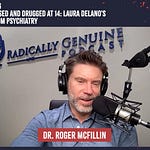On episode 146 of the Radically Genuine Podcast I interviewed Dr. Eric Maisel to discuss the profound and often contentious issues surrounding mental health, religion, psychiatry, and the nature of human consciousness. Dr. Maisel, a prolific author and critical thinker, shares his insights on the pathologization of everyday struggles, the impact of psychiatric diagnoses, and the importance of reclaiming personal meaning and resilience. Dr. Eric Maisel is a psychotherapist, coach, teacher and author of more than 50 books that include “ Rethinking Depression: How to shed mental health labels and create personal meaning” published in 2012 , “The Future of Mental Health: Deconstructing the Mental Disorder Paradigm in 2015 and his most recent book “Redesign Your Mind” published in 2021. His contributions are diverse and vast. A lifelong atheist, Maisel described in his 2009 book The Atheist's Way: Living Well Without Gods how individuals can negotiate the paradigm shift from seeking meaning (in religion, spiritual pursuits, or anywhere else) to making meaning. In a vulnerable and interesting exchange I challenge Dr. Maisel on many of his beliefs and explore his childhood background and fears of spirituality and faith.
Topics Explored:
The Medicalization of Human Experience:
- Dr. McFillin opens the discussion questioning the rise in mental health diagnoses and whether it signifies genuine disorders or the pathologization of normal human experiences.
- Dr. Maisel critiques the psychiatric model for labeling everyday emotions as symptoms of mental disorders, drawing parallels to historical uses of diagnoses for social control.
Spirituality and Institutional Influence:
- Dr. McFillin and Dr. Maisel discuss the role of religious and spiritual institutions in providing meaning and solace, despite their susceptibility to corruption.
- The potential for community and group efforts to counteract the influence of the psychiatric model is considered.
Personal Meaning and Life Purpose:
- Dr. Maisel emphasizes the importance of living a purposeful and intentional life, suggesting that focusing on life purposes rather than moods or meanings can lead to greater fulfillment.
- The concept of "doing the next right thing" as a guiding principle for living a meaningful life is explored.
Future of Mental Health:
- Dr. Maisel shares his vision for the future of mental health, emphasizing individual efforts and the importance of critical thinking within the mental health profession.
- The need for peaceful yet determined resistance against the prevailing psychiatric model is highlighted.
Historical Context and Development of Psychiatry:
- Dr. Maisel traces the origins of psychiatric diagnoses back to the 1950s and earlier, highlighting the evolution of the Diagnostic and Statistical Manual of Mental Disorders (DSM).
- The analogy between physical and mental health issues is critiqued, emphasizing the arbitrary nature of symptom categorization in psychiatry.
Critique of the DSM and Mental Health Labels:
- Dr. Maisel argues that the DSM’s approach to diagnosing mental disorders is fundamentally flawed, focusing on symptoms rather than underlying causes.
- The implications of labeling, including the placebo effect of receiving a diagnosis and the potential for misdiagnosis, are discussed.
The Role of Psychiatry in Social Control:
- The conversation delves into the use of psychiatric diagnoses as tools for social control, drawing historical parallels to practices in totalitarian regimes.
- The impact of the current mental health paradigm on societal norms and individual freedoms is examined.
Quotes
“Have we pathologized the very nature of being human?” – Dr. Roger K. McFillin
-“Our life purposes should trump our interest in our mood.” – Dr. Eric Maisel
“The DSM is silent on causation, silent on treatment, and is essentially a shopping catalog for labels.” – Dr. Eric Maisel
















Share this post